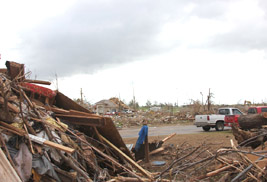
¡Ω–‘…´ŒÁ“π University Associate Professor of Geography
Andrew Curtis and student Spencer Baker traveled to
Moore, Okla., to survey damages caused by a tornado.
(Photo credit: Andrew Curtis)
Not even 10 days after the devastating tornadoes hit Moore, Okla., ¡Ω–‘…´ŒÁ“π University Associate Professor of Geography Andrew Curtis and student Spencer Baker traveled to Moore to survey the damages. The data collected will be sent to the Moore city government to use in its recovery process and also will be published in academic journals.
“The experience is obviously powerful, especially a week or so after the disaster happens. Everything is very raw,” says Curtis. “It’s a very emotional experience for everyone.”
Curtis and Baker used a set of seven cameras to survey the data. The cameras contain an internal GPS, which means the video can later be viewed in software, where the location of the vehicle is shown on aerial imagery – the same as used in Google Earth.
Baker says they can look at satellite images to see exactly what house they are in front of, which is how they collect data and stay out of the way of the recovery process.
“Recovery is an important part of what we’re doing,” says Baker. “Going forward from here is the recovery, and seeing how Moore will respond to this. How each street, each home will move back into the area or not.”
Curtis says an ideal team to collect data is three people. A student from the University of Oklahoma helped with the driving during data collection.
“I always like to bring in local area students because they bring a lot of experience,” Curtis says.
This was Baker’s first field experience outside of Ohio. He has worked in Akron and Youngstown before, but nothing like Moore.
Curtis has seen this type of devastation before. He has done field work in New Orleans for Hurricane Katrina, Joplin, Mo., and wildfires in southern California and Colorado.
“It’s emotional and it’s powerful,” says Curtis. “We can’t let it affect what we’re there for — something that could one day save lives.”
Curtis says there are many aspects to the data collected that explain the amount of damage to different areas. In areas where it is known there will be tornadoes, this assessment can be used to determine best possible precautions.
The trip was partly funded by a quick response grant from the University of Colorado’s Natural Hazards Center.
See more information about ¡Ω–‘…´ŒÁ“π‚Äôs Department of Geography.